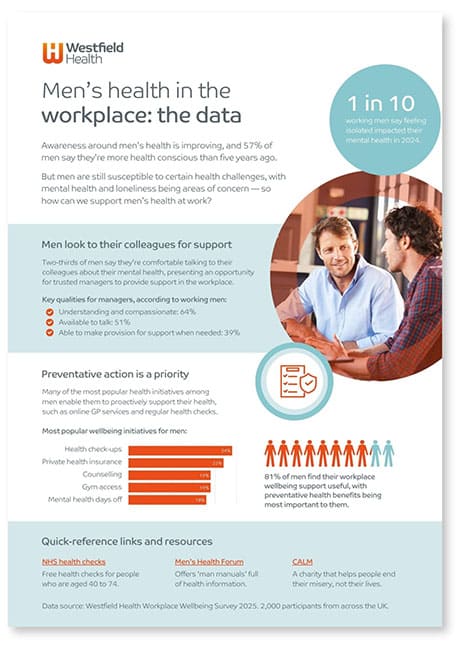Attitudes towards men’s health are changing. More men are starting to take a proactive approach to their health, marking a positive shift. However, Deloitte found that 64% of men feel that stereotypes have affected their health behaviours and experiences in healthcare settings. When it comes to health, many still face significant barriers to seeking support—whether due to stigma, lack of awareness, or workplace culture.
Our 2025 Workplace Wellbeing Survey, which gathered insights from 2,000 employees across the UK, sheds light on the challenges men face in accessing the help they need and the steps employers can take to close the gap.
Changing attitudes towards men’s health
Since the pandemic, 57% of men say they’ve become more health conscious. Many are taking a more proactive approach to their wellbeing—both physically and mentally. Here are some ways that men’s physical and mental health have changed in recent years:
The change in physical health
Although men face higher rates of preventable health issues, they are less inclined to seek medical attention from their GP. Despite this reluctance, more men are taking a proactive approach to their own wellbeing since the pandemic. Almost 1 in 3 (30%) say their physical health is better than five years ago, and 28% say it’s got better in the past year.
The change in mental health
Two in five men state that they regularly feel symptoms such as low mood or worry. Although awareness around men’s health is improving, one area of growing concern is isolation. One in ten working men feel that isolation has affected their mental health in the last twelve months. Isolation can lead to loneliness which can increase the risk of depression, anxiety, and even physical health issues such as high blood pressure and weakened immunity.
Mental health support for men
Only 36% of NHS referrals to therapy services are from men. When it comes to mental health, most men are turning to trusted personal connections for support rather than professional services.
Nearly four in five (78%) say they would feel comfortable opening up to family or friends, and 60% say the same about colleagues. With isolation being a factor effecting men’s mental health, having these support systems both in and out of the workplace is important for wellbeing.
Workplaces are become a valuable place for supporting mental health. With 68% of men feeling that their values align with their company, this is a way to build on that support system through having shared goals, understanding and being a part of something greater than themselves.
The top ranked wellbeing benefits
81% of men say workplace wellbeing support is useful—showing it plays a vital role in male-dominated spaces. It’s a practical way to support men’s health in the workplace and show it is a priority.
Workplace initiatives are not just a cost but a vital investment in your people’s long-term resilience, health and productivity.
Dave Capper, CEO at Westfield Health
Men are especially interested in benefits that allow them to be proactive and prevent health issues before they escalate. The most desired include health check-ups (24%), private health insurance (22%), counselling (19%), gym access (19%), and mental health days off (18%). Many of these are simple to implement and make it easier for men to access the care they need—without always having to rely on NHS services with long wait times.
Wellbeing support helps attract and keep male talent
With 38% of men thinking about changing jobs, benefits play a key role in keeping them. It’s not just about pay—feeling supported and valued at work matters to employees. Businesses that offer meaningful support are more likely to hold on to their people and stand out to new talent.
Beyond salary, men are most interested in wellbeing support (56%), flexible hours (53%), and remote working (31%). These rank higher than things like promotions or company status, showing that practical support and prioritising wellbeing makes a real difference to attitudes towards work.
Download our free men’s health data sheet
This free PDF guide offers the latest data on men’s health as well as tips to support men’s health in the workplace. The quick-reference links are available to discover free health checks, information and helpful resources.
